Negotiation is not an act of battle; it’s a process of discovery.
Chris Voss
Key takeaways
- Early preparation is key to success
- Document everything
- Do your research and develop your business case
- Be collaborative, especially when handling objections
- Keep a positive attitude, showing commitment to the company
Introduction
Welcome to the third post in my Salary Series! In my previous post, I wrote about how companies determine employee salaries. In this post, we’ll leverage all the knowledge we learnt and my experiences to help negotiate a salary raise!
Below, I share a detailed, step-by-step guide on how to operate from a position of strength to get the salary raise you want.
Fundamental methods to increase your salary
Before we dive in, I want to share the ways to increase your salary, which are to:
- Negotiate a higher salary for your current role
- Get a promotion or job offer within the same company with a higher salary
- Get a job offer with another company that pays higher (job hopping)
For this post, I’m focusing on negotiating a higher salary for your current role. Future posts will cover how to negotiate salaries when getting a promotion and also when job-hopping.
But first: The most critical factor to long-term salary (and career) growth
In the short term, negotiating and job hopping will lead to salary increases, but that’s a short-term bump.
In the long term, salary growth will ultimately need to come from 2 underlying factors:
- Value. The more that you deliver, the more you are compensated for it. This is derived from
- Locus of responsibility – the more people and scope you look after, the wider potential value you can deliver due to the ability to drive outputs using the resources assigned to you
- Magnitude of Impact – how much change and positive outcomes you affect
- Scarcity. The harder it is to attain the skills and experience required of the role, the higher the salary for the role. This typically boils down to (non-exhaustive)
- Supply of similar candidates. In the industry, we describe markets as candidate-long or candidate-sort markets
- Generic vs specialised skillsets. Specialised (or technical skillsets) that are harder to acquire will command a premium, but only up to a point.
The TL:DR is, you need to be a high performer. High performers take on more responsibility, get more senior positions, and ultimately deliver higher value. And that’s what ultimately drives a sustained upwards trajectory in your salary that lasts for decades.
If you’re an average (or below average) performer, and you keep on asking your manager every year for an above-average salary increment, you’re just going to frustrate your manager.
Don’t forget to constantly develop yourself and perform better than the day before.
Principles of salary negotiations
No matter the process you take, the principles below are what I believe are true in all salary negotiations.
Understand the process. If you don’t understand the process and play the game, you’re trying to swim against the current. That’s why I wrote the previous post on how companies decide employee salaries.
Pre-read before meetings. The bigger the stakes, the more important it is to send a pre-read before a meeting. Pre-read is giving upfront information/documentation ahead of the upcoming meeting to allow the audience to digest the information and prepare for it. This allows the audience not to be caught off-guard, be informed and prepared before the meeting. You should do the same in salary negotiations. No manager likes being put on the spot when a team member suddenly asks for a salary raise.
Document everything. You’re going to need data points. No one can argue against objective data on results, contributions, and positive feedback from others. If you take the time to document everything immediately throughout the year (and not 3 days before you have the meeting), you’re going to have a mountain of data to justify your promotion that will be hard to argue against.
Timing matters. You don’t ask for a raise when the company (and the economy) is struggling. You also need to find the best timings to schedule meetings with your manager. The right conditions are 1) The company is performing well, 2) You are performing well and have just achieved a milestone, and 3) Your manager is also in good standing at work.
Be professional, polite and positive. Your manager is not going to react well to direct/veiled threats. The uncomfortable truth of the workplace is that everyone is replaceable, including you. So why burn bridges?
Make it easier for your manager. Your manager either has to justify your raise to their manager or ask someone higher up the ladder for approval. Make it easier for your manager by 1) removing barriers, 2) creating materials to easily communicate your proposal (see Business case later on)
Show future commitment. Most people justify salary increases based on past performance. The more compelling narrative is to justify a salary raise based on what you can deliver in the future. Why would a manager agree to a raise if they don’t know if you’ll stick around in the next 6 months?
Use annual gross salaries. This shows your business acumen. Fully loaded employee expenses are typically 1.5x – 2.0x of gross annual salaries (because of insurance, office space, equipment, other benefits, etc). The layperson thinks in terms of a monthly base salary. Leaders and business-savvy people think in terms of the total package. You know your cost to the business, you can quantify the ROI of salary increases versus the value you bring. Gross means annual salaries, including employer EPF and allowances (exclude bonuses, include “13th month salary”). If you stick to a mindset of monthly base salaries, you potentially leave money on the table, i.e. higher employee EPF contributions, allowances, and also big picture thinking from a PF perspective.
The salary negotiation process
Alright! Let’s get into the nitty gritty of it. Another disclaimer here, many are going to think this is way too much work, and that it’s not worth it. But then again, above-average performers put in the work and get better salary raises. How badly do you want it?
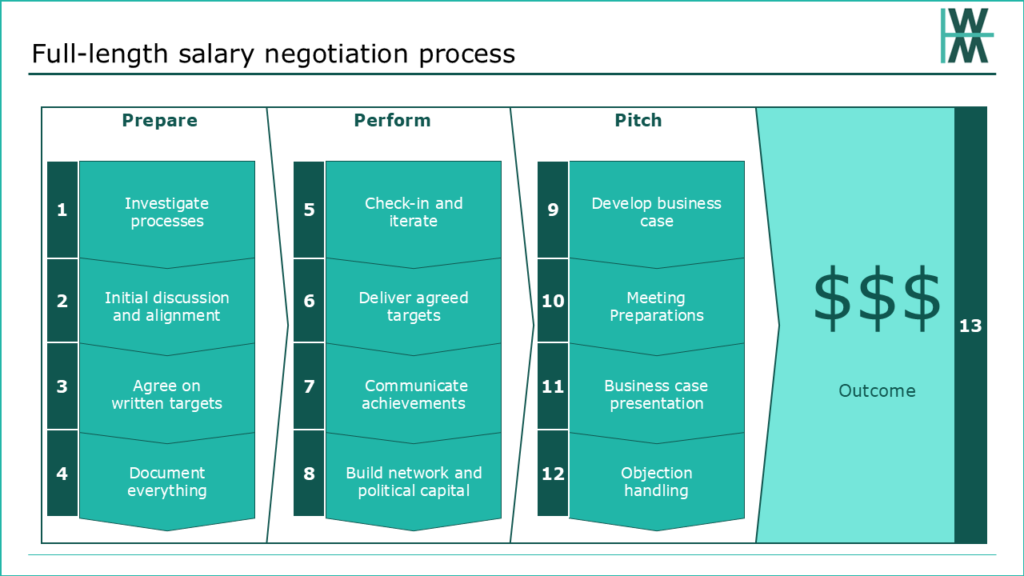
Step 1: Investigate processes
This is super important. Uncover the detailed salary policies and processes for your company. You need to tailor your approach to how your company manages the process. Don’t fight against the current; work with it.
Where and how do you find this information?
- Search internal HR policies and documentation. This would be on your company intranet/portal and sometimes even part of an employee handbook. If you’re lucky, the whole process might be explicit and transparent
- HR announcements and emails. Before performance reviews, you’ll normally receive emails and updates on how the process works, along with key dates.
- Chat with your team members/colleagues. Many people are willing to share information about their salaries, experiences and insights. If you’re lucky, you can get a lot of insights, especially with more senior/experienced colleagues who might share with you data points that can help you argue your case for a salary increase (such as what they’re earning, what are typical salary increments, which managers are receptive to it, etc)
- Make friends with HR and Finance. These two departments are key. If you have friends / close colleagues in Finance, you’ll know in greater detail what the annual budget planning key dates are, how the employee expense budgets are shaping up for next year (e.g. 5% increase to total pool), and senior management’s sentiment on the company performance. If you build relationships with HR, you might even get snippets on what the grade levels are like for your level (and above you), or even who the actual decision makers are for salary increases, etc.
- Ask your direct manager. You’re in good standing with your manager, right? You’re a good performer, have good rapport, and have regular fortnightly 1-on-1 catch-ups, right? So go ahead and ask your manager, “How does the salary review process work here?”. If you’re not in good standing with your manager, maybe you should be working on that first before even thinking of asking for a raise
- Connect with previous employees. Know someone who used to work at your company? They might be willing to be more open and transparent, as there’s less risk of any consequences for them sharing information with you
Step 2: Initial discussion and alignment
You’ve developed an understanding of how the game is played at your current company; now it’s time to plant the seeds and set things in motion. If you haven’t asked your manager how salary reviews and increments work at your current company, this is an excellent way to broach the topic of a salary raise.
How do you go about it? Well, before your next 1-on-1, send a note to your manager with your usual pre-wire updates, at least 2-3 days beforehand (pre-wiring in general is such an underrated move, I should write a whole article about it).
Something like this:
Hi [Manager],
Here’s an update on the topics I’d like to discuss in our 1-on-1 tomorrow.
- Progress updates on [Project]. [What I have achieved], [Challenges and what I’m doing to resolve them], [Where I need support]
- Feedback on my performance in the past 2 weeks. I would love to get your feedback on what’s working well and what’s not, especially on that presentation I did on Tuesday
- Salary review process at [company]. I’ve read the HR policy on the intranet, but I’d like to understand in further detail how it works as well as your own experiences. I’d also like to explore developing a plan together that grants me a mutually agreed salary increase (above baseline) upon hitting agreed targets and delivering value above expectations
Thanks,
[Name]
This gives your manager the time and space to gather thoughts and react accordingly in the meeting. Contrast this with “ambushing” your manager during the performance review period; your manager would highly appreciate it if you brought this up beforehand.
In the meeting itself, you would ask questions to get better clarity on the process, close any gaps in your understanding, and most importantly, to test the waters. Some key points to broach during the meeting, once your questions about the salary review process have been answered:
- “I’d love to hear your thoughts on what it would take for me to be given a salary raise during the annual performance/salary review cycle”
- “I’m interested in growing my career here for the foreseeable future. And I hope that would translate to recognition as I continue to deliver more and more value for the company.”
- “I know it’s premature to talk specific figures, because in addition to next year’s budget not being finalised, I need to actually deliver results beforehand. I bring this up now to ensure potential increases are accounted for in the budget planning sessions.”
- “Could we agree on some stretch targets and milestones in addition to the standard KPIs, that if I achieve, would put me in good standing for you and [decision maker] to grant a salary raise? I’d be happy to draft the key points based on this discussion which we can align on in our next catchup”
As you can see, this is not the meeting where you already know how much you want (although you may have a number in mind). You don’t know if your manager hates people asking for raises. You don’t know what the barriers are in the process. Your immediate objective is to see how your manager reacts and use that to prep for the next discussion.
Some managers may want to see if you already have a number in mind, which I would say:
“At this point, I don’t think it’s helpful for us to agree to a specific amount. I may hit my targets, but the company overall might have a tight budget limiting salary increments, which puts you in a difficult position. Also, whatever we agree here may end up being less than the resulting increments for an above-average performer. Can I propose a number when it’s closer to performance review season, when you need to know how much increase to account for in the budget planning for next year?”
If your manager reacts badly to this meeting, you know you’re not in good standing, and you might want to consider your prospects in that team (or company).
If your manager is neutral, e.g. proposes to revisit salary discussions closer to the performance review cycle, it’s still alright. You’ve flagged upfront your intentions, and you can skip the next steps (3 & 4).
Ideally, you would have received some feedback during the meeting that you can use to propose targets at the next 1-on-1 on what you need to achieve to get a salary raise. A simple 1-pager with bullet points articulating SMART goals should do.
The best time to do this is at the beginning of the financial year, during the KPI setting season. As you’re setting up your KPIs with your manager, it’s opportune because you can set the typical targets, but also stretch targets to get that salary increase.
Step 3: Agree on written targets
Based on the initial discussion and other pieces of information, develop a draft one-pager or bullet points in an email of what you propose as targets to achieve to get a raise. Send that to your manager a few days before your next 1-on-1, similar to step 2.
In your 1-on-1, you refine the targets and hopefully get an agreement/understanding that your manager will increase your salary above the baseline (meaning, the basic inflation salary increment all employees will receive).
Your manager might ask how much you expect to receive as part of the agreement. Your manager may not. My suggestion is to reemphasise what I suggested in Step 2.
Once you agree on the targets, save the document with your targets and send it to your manager. This is important to ensure that the agreement is locked in.
Step 4: Document everything
Note: Some company KPI targets have base and stretch goals. Whether you align the stretch goal KPIs to the targets for getting your salary raise is up to you.
Again. Document everything. I have an email folder in my inbox titled “Feedback”. Every praise, every milestone achieved, every performance result worth documenting goes in there. Every report/dashboard that is related to your outputs should go in there.
Outside of that email folder, every few weeks or every month, block out time to gather data on your projects and daily tasks. How well you’ve performed versus your targets AND in comparison with your colleagues (yes, working life is competitive). Keep track of it in your performance file, a.k.a. detailed CV. It’s like a lengthy journal of accomplishments; it will also serve you well when looking for a new job. I’ll cover it in more detail in a future post about job hopping.
All the information you gather will be important in creating the business case that you forward to your manager when asking for the raise.
Step 5: Check-in and iterate
You’re still having fortnightly check-ins, right? Every month or two, take the opportunity to discuss your progress towards hitting those targets and also receive feedback so you can improve. Continue documenting and getting alignment so that you know you’re on the right track.
In a 1 on 1 check-in that coincides with budget season, remind your manager of the agreed plan, and get a deeper pulse check on how your manager views your performance.
Step 6: Deliver on agreed targets
I don’t need to tell you how you’re going to excel at your job and deliver above expectations. That’s up to you!
Step 7: Communicate achievements
Sometimes your manager may not even know the extent of the hard work you’ve put in, and sometimes they may not even know the outcomes or results of your efforts. This is where the extroverts and people who promote (brag) about themselves shine. You need to be comfortable with promoting yourself.
Now there is one other person who it’s even more important to promote yourself to. It is the decision maker who is highly likely to be your manager’s manager. Does he/she know who you are? What have you achieved? The value do you bring to the company? Do you have a good relationship with him/her? If the answer is no to all these questions, why would that person approve your salary raise, even if your manager fights for you?
The simplest way to promote yourself to your manager’s manager is to have a coffee catch-up with them. In that meeting, be curious but also subtly reveal what you have been doing and achieved, and heap praise on your manager. Bring up how you enjoy working at the company, how you want to deliver more impact and more value, etc.
Step 8: Build network and political capital
How is this relevant to your salary raise, you may ask? Many companies have 360 feedback loops for each employee as part of performance reviews. But even if not, the more advocates and “sponsors” you have in the company, the more people you have to vouch for you via “back channels”.
This becomes especially important if performance reviews undergo calibration among managers across the company. Other managers whom you don’t report to may vouch for you in these calibration meetings. When I was in consulting, it was quite typical for us to approach as many “seniors” above us, all the way to partner level, to support our promotions/reviews in these meetings. I’ve also been a manager who has vouched for other employees in these discussions.
Step 9: Develop business case
What is a business case? It’s a general term to describe a document that articulates a proposal or pitch, with justifications clearly articulated (typically in the form of an ROI).
Developing a business case is crucial to getting the best outcome. Why? It shows black and white proof with all the research and analysis proving you deserve a raise, eliminating any objections in the process.
It can be in the form of a Word document or PowerPoint slides. Whatever suits your style. What’s important is putting it in writing.
Your business case would have the following components (along with examples of “what good looks like”).
Context. Recap previous discussions and the agreement between you and your manager. Don’t forget to include “The Ask“, being the specific amount of raise you’re asking for.
Something like the slide below:
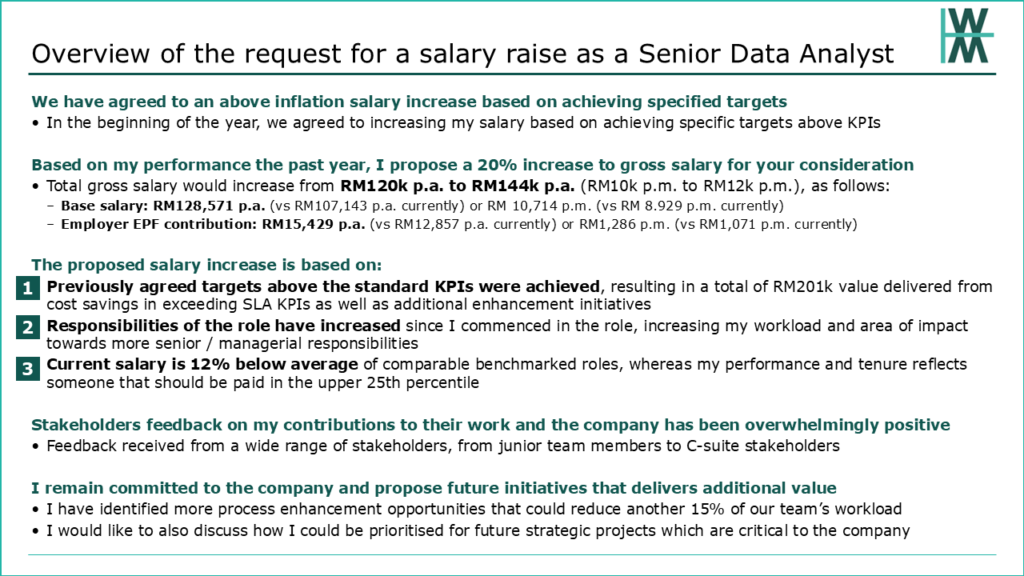
Justifications. Technically, the example above had the justifications already. But in the following section, you would expand the justifications in more detail. You also need to show evidence for each point. Some examples of types of justifications:
- Achieved previously agreed targets for a salary increase (as per step 3)
- Delivered exceptional value above BAU targets, totalling [XX] for the company, contributing [XX] in revenue and [YY] in cost savings
- Performance in the top 25th percentile across comparable roles in the company (relative to peers)
- Underpaid relative to internal and external benchmarks
- Position assumed higher responsibilities over time compared to the original role responsibilities
The slide below shows how you could translate your achievements into quantitative benefits (which would ideally be more than the raise you’re asking for):
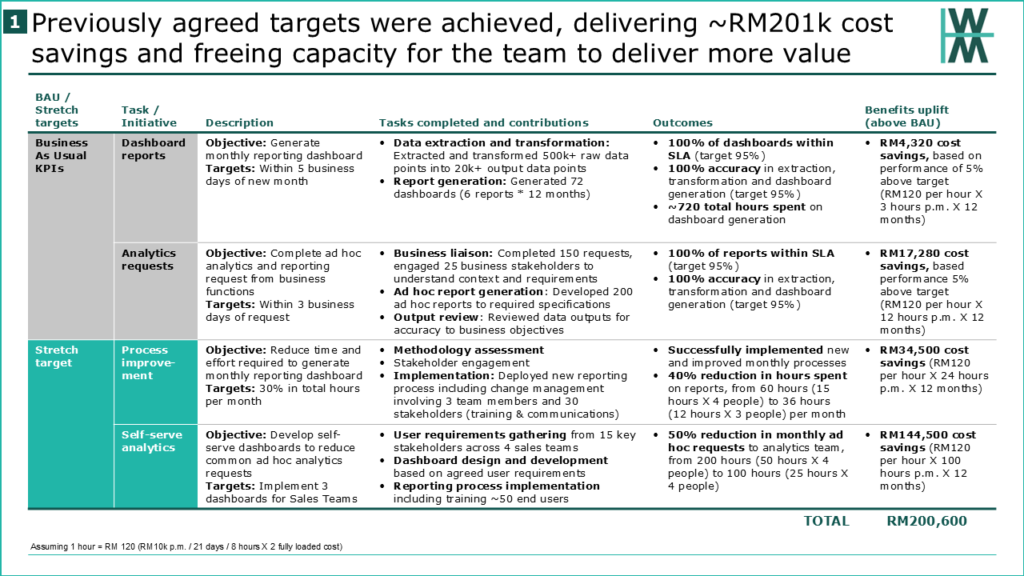
The example below is a sample slide outlining how the responsibilities of your role might have expanded from when you first started in the role. Don’t forget to quantify how much additional tasks, time and effort are spent because of the increase in responsibilities.
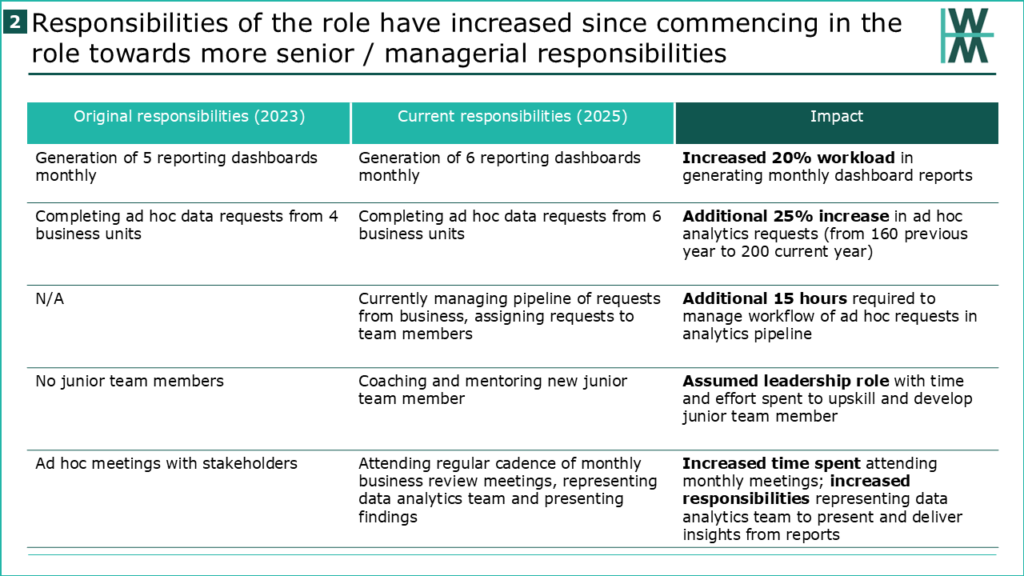
Showing data points showing how your salary stacks up versus other comparable roles is extremely powerful. It’s a lot better than just verbalising “I’ve done market research and I think I’m 20% underpaid”.
Research salaries on Glassdoor, MalaysianPAYGAP, recruitment firm salary reports, job portal salary reports, etc. Also, do include links/screenshots in the appendix for proof of these salaries, for which you compare your current and proposed salaries.
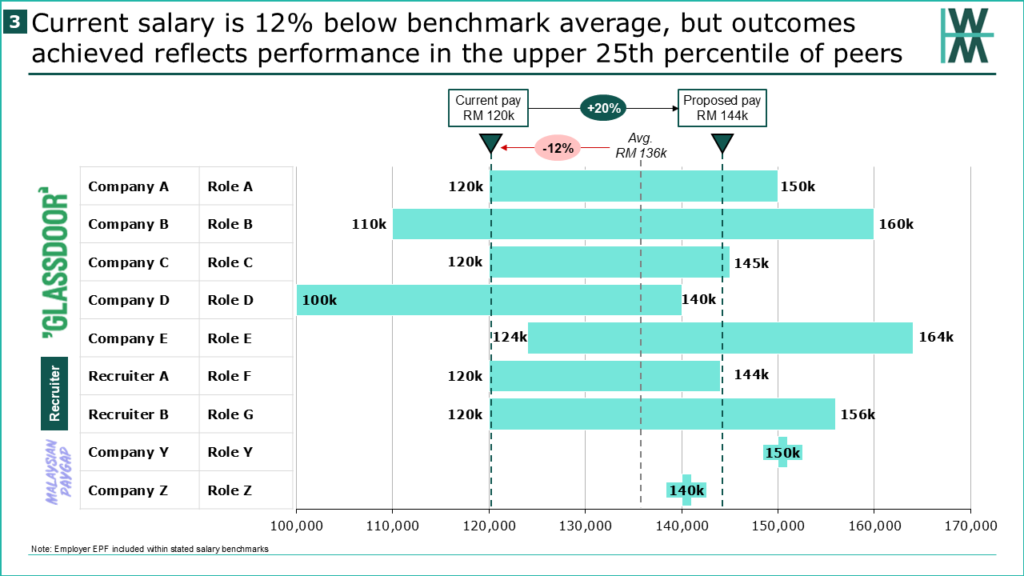
Stakeholder feedback. Show comments/feedback from others/champions, which validates your performance and how much that “stakeholders across the company and customers recognise and value what I deliver”.
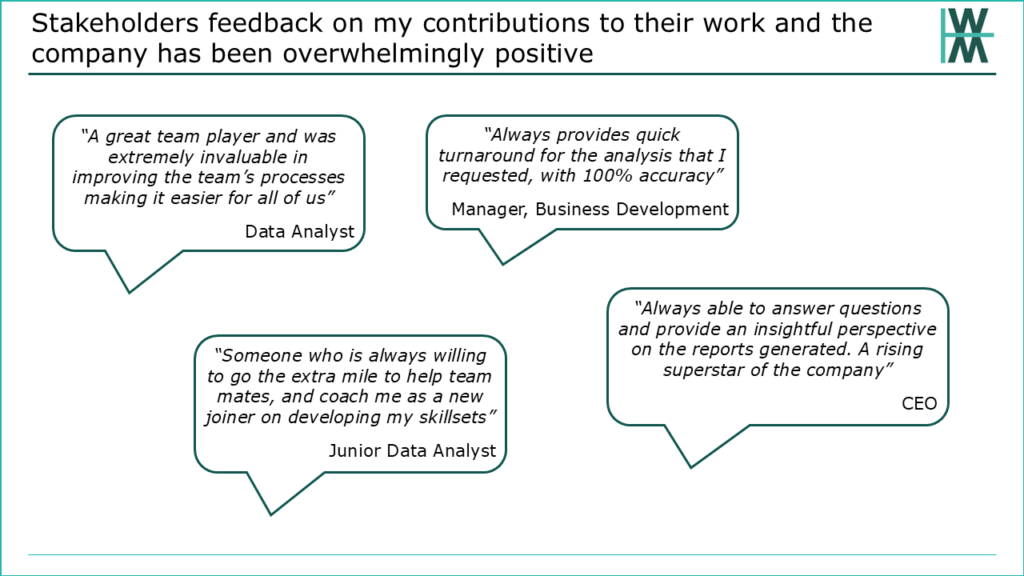
Plans to deliver additional value. You need to show that you are committed to the company and are not a flight risk. You need to show them that it is worth investing in you and granting that salary increase.
So what do you do?
- You identify new opportunities to deliver value, eg more process improvements, will take on more responsibility, etc., and propose that you take them on in the future.
- You emphasise that you want to be involved in key projects and be a significant contributor to the success of the company, so you have aligned interests and show even more commitment
Something like below:
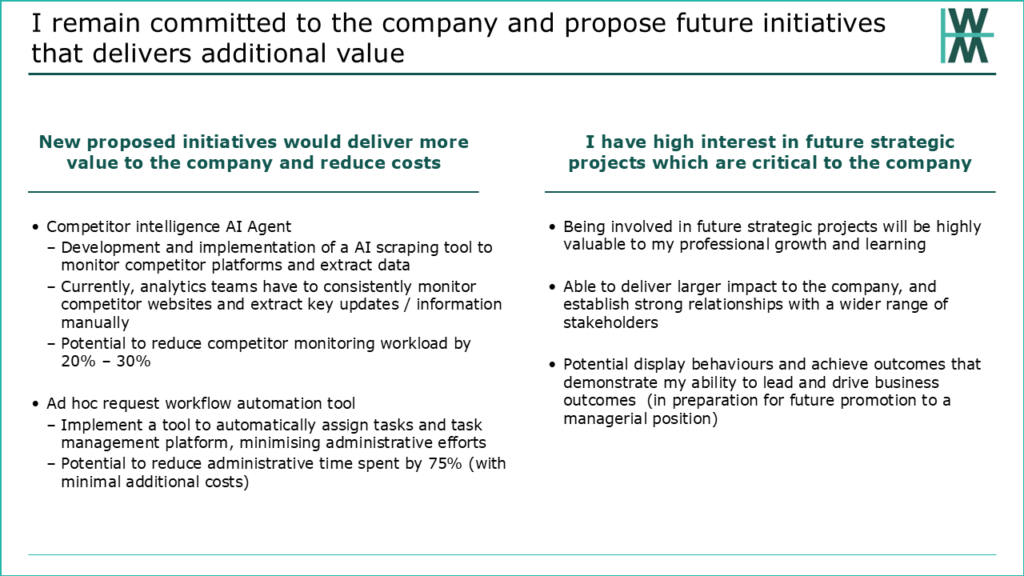
Appendix. Include any additional supporting documentation/evidence as necessary to back up your case.
Step 10: Meeting preparation
You’ve got the business case, now you need to make sure it is bulletproof. Three key ways to prepare to land the negotiation:
- Ask someone to review your business case. A friend, a mentor, or your partner can help. No errors, nothing too aggressive or rude. Always worth having a second pair of eyes to spot any gaps or issues.
- Practice by role-playing. Similar to practising for interviews, have someone role-play your manager and so you can rehearse your key talking points
- Send the pre-read. Send your business case as a pre-read to your manager before the meeting where you will discuss your business case. A few days to a week before. This gives time and space to your manager to carefully consider the business case, and he/she will respect you for that (in addition to being impressed at the amount of due diligence you have put into your business case)
Step 11: Business case presentation
This can be daunting for many people, especially if it’s your first time. The good news is, you’ve done all the legwork throughout the year and emailed a pre-read. As a reminder, the pre-read gives your manager space to think, and makes the conversation easier to manage.
Be confident, assertive, yet collaborative and polite. An example flow and scripts for how to carry the conversation are below. Do ensure you rehearse this as part of Step 10 Preparation.
Cover key points
As per my business case, I’m asking for a salary raise of 20% increase from RM120k to RM144k which based on 3 reasons:
- I have delivered to targets that we previously agreed which are above the usual KPIs, resulting in a total of RM 201k value delivered from cost savings
- My responsibilities have increased since I came into the role, which has increased my workload and area of impact towards more senior/managerial responsibilities
- Versus comparable roles which I have benchmarked against, I am paid roughly 12% below average, whereas my performance and tenure reflect someone who should be paid in the upper 25th percentile
Re-emphasise commitment to the company
I recognise that the salary increase is an investment in me, and hence, I want to emphasise my commitment as I see my future here growing with the company. I have outlined some areas which I think I can deliver additional value in the coming year, in the form of [additional responsibilities / improvement initiatives / etc.]
Share that you’re happy for your manager to forward the document to whoever is part of the review/approval process
I’m aware that the approvals may be with someone above you and I appreciate you bringing my case forward. Please share my business case as needed to justify the raise with all parties involved in the approval process [name them if you know who they are]
Seek open-ended feedback from your manager
What do you think about the salary raise and business case I have put forward?
Pitch it like a collaborative effort, remove blockers
What are potential roadblocks to getting the raise, and what additional actions can I take to help make this easier for you?
Step 12: Objection handling
If you’ve done the work and your justifications are valid, there should be fewer chances of pushback from your manager.
However, it can still occur more likely than not. You can only show your worth and try to influence the decision. Some additional tips
- Use open-ended language (avoid yes or no questions)
- Empathise with your manager (who may be in a difficult spot), reframe the conversation to be collaborative, e.g. “What could we do together to solve this challenge?”
- Focus on using calibrated questions, e.g. “How does this sound to you?”
I won’t plagiarise too much, so I recommend reading this article titled “Asking for a raise? Here’s what a hostage negotiator would do” for some of the best negotiation tactics using collaborative, unthreatening language. No point regurgitating a post that has better information and experience than I do on the topic.
Step 13: Outcome
If you receive the raise you requested, congratulations! Be appreciative, thank your manager and celebrate!
If you were rejected or received less than you asked for, accept it gracefully. Again, be polite, professional and positive. Ask your manager, “What can I do to get the raise next year?”. This demonstrates grace, commitment, openness to collaboration, and, most importantly, the ability to manage expectations that you’ll continue the negotiations in the next annual cycle.
What you should never do when negotiating
Use personal reasons as a justification. Your manager and company are not responsible for your personal commitments and circumstances. It’s unprofessional to use guilt and a sad story to try to appeal for a raise.
Discussing your salary raise potential at every single check-in. Focus on delivering value, i.e. performance and improving from feedback. Don’t be needy.
Threaten to find another job. Most people don’t respond well to threats. Especially when every employee is fungible and replaceable.
Get the raise and then quit. This is just extremely bad etiquette.
Propose a salary range. Always be specific. It shows that you are confident and have done the work to ascertain your value. Plus, if you give a range, why would the decision makers give you anything less than the minimum of the range you proposed?
Use a colleague’s salary as a justification to increase your salary. You found out your colleague is being paid more than you. A lot more. You’re envious. It’s not fair. You raise it as a point. It’s not going to end well. There could be a multitude of reasons why your colleague is paid more (even though they are a much better performer than you). Don’t open up a can of worms or Pandora’s box. You might not like what you see. Play the game.
FAQ
Not all roles have quantifiable metrics that can translate to dollars and cents
I’d wager 95% of job responsibilities can be quantified into metrics and compared. Examples:
- HR – Average time to hire of 2 months from job posting request to signing of offer letter across 50 hires, 20% faster than department average, with 100% offer acceptance rate (vs 95% department average)
- Software engineer – Shipped 30% more commits than team average, with 20% fewer defects identified during code review and test phases
- Nurse – Patient-to-nurse care ratio 20% above ward average, with a 0.001% medication error rate vs the hospital average of 0.008%
- Graphic designer – Delivered creative outputs consistently 2-3 days before SLAs (30% higher efficiency), resulting in a productivity uplift of 20% additional client deliverables
And once you can quantify, you can convert that to cost savings (hours saved to salary cost) or revenue uplift (additional sales or yield from your contributions).
Won’t sending a pre-read to my manager give them time to come up with counter-arguments?
Sure. But if your business case has gaps and counterpoints to begin with, that just means your business case isn’t strong, and maybe the raise isn’t justified.
Some of these steps seem over the top, like having an agreement on stretch targets or developing a business case document. Isn’t it too presumptuous / try hard?
I’m outlining a comprehensive step-by-step salary negotiation process based on “what good looks like”.
Most people don’t even ask for a salary raise. And out of those that do, are underprepared for it. What makes you think putting in less effort than I described will get you that raise?
Of course, there’s an element of what’s suitable based on your specific situation (e.g. if you just got promoted, don’t go discussing a potential raise in the next cycle). Use your best judgment.
Wrapping up
Salary raise negotiations aren’t easy, and there’s no guarantee you’ll get the raise you want.
If you feel that you’re not getting raises because you’ve reached the ceiling for that grade level (or some other reason), perhaps it’s time to get a promotion or job hop.
Which are the next two topics for my upcoming posts in this Salary Series.
Read next: Negotiating a job offer salary



